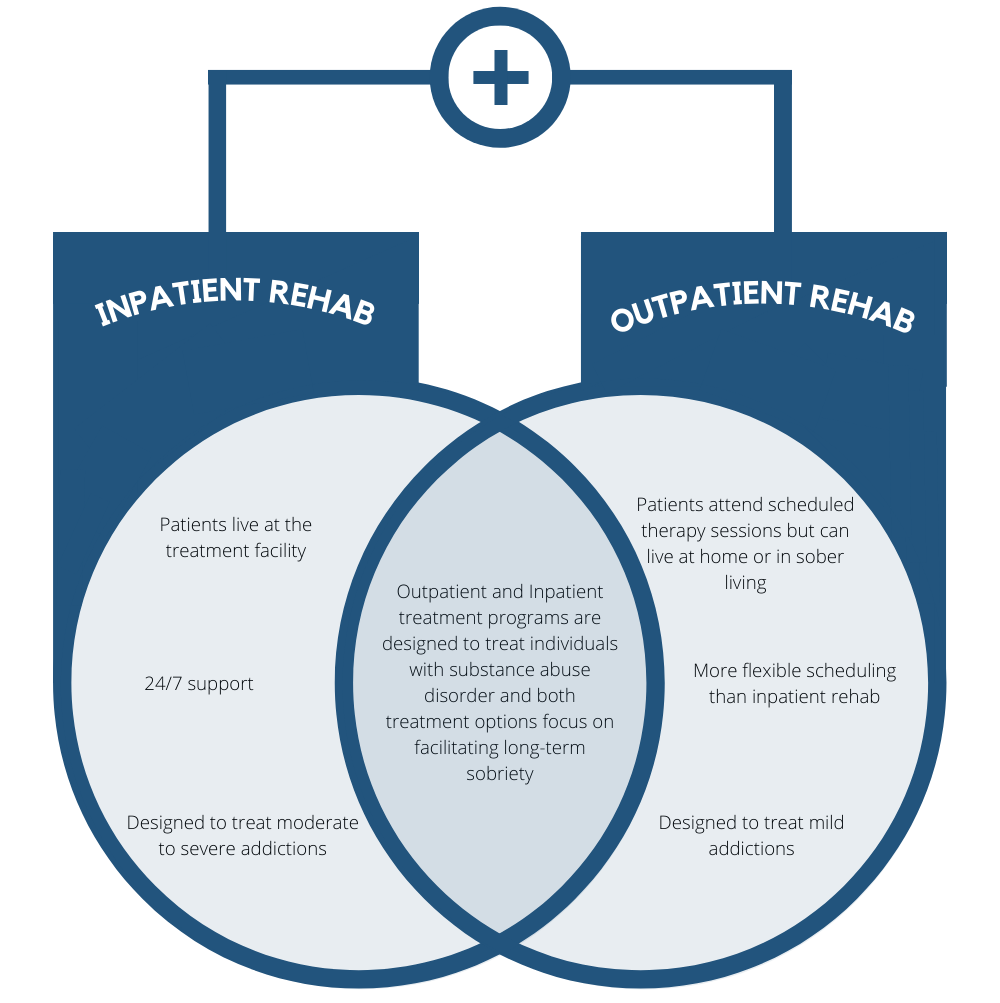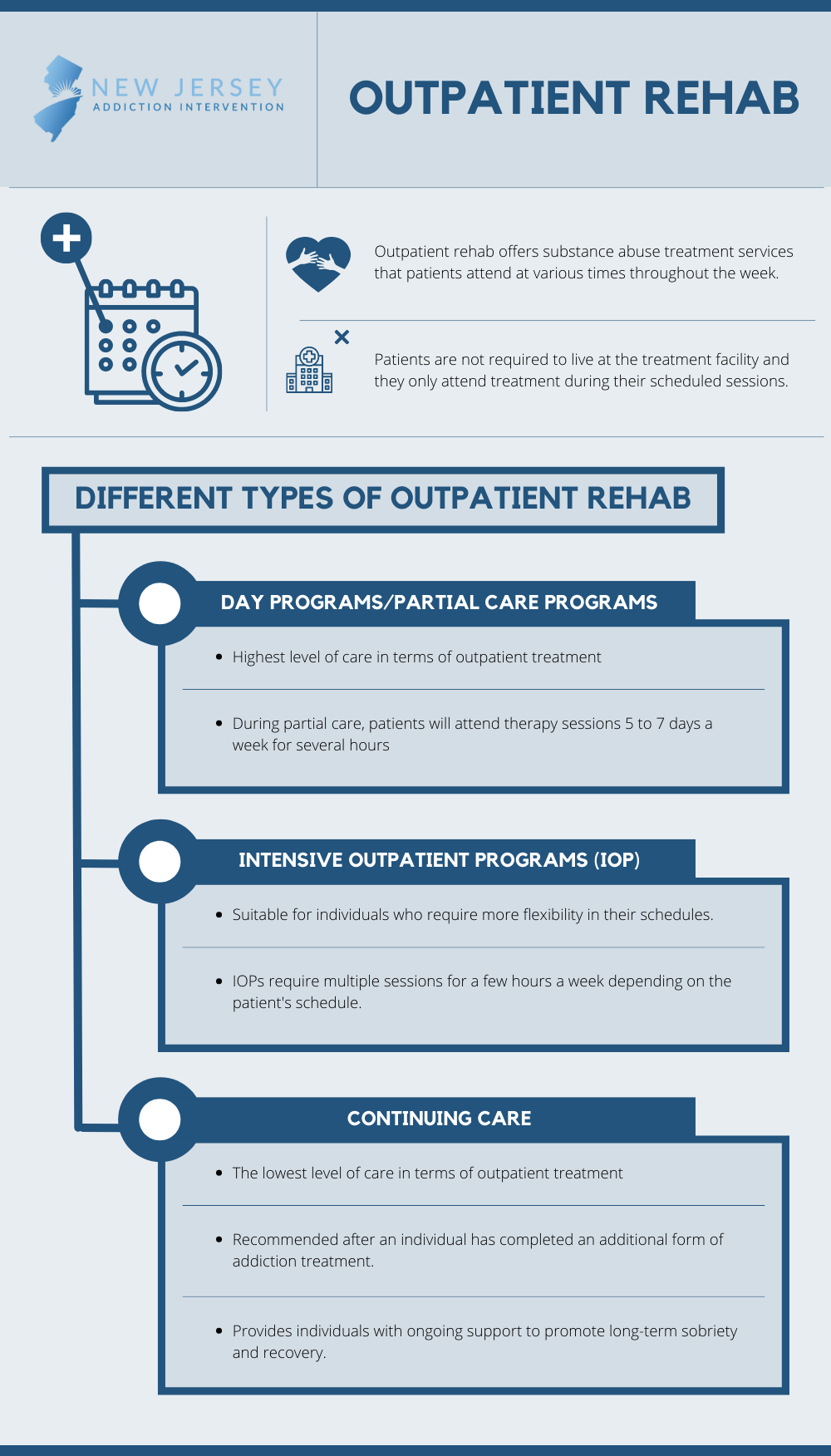Making the decision to ask for help is difficult enough, but many people also find it challenging to figure out which treatment program is right for them. Once you’ve decided it’s time to go to rehab, you’ll have to choose between an inpatient and outpatient rehab program.
Both types of programs have their strengths and weaknesses, so it’s important to consider both your personal needs and what benefits each type of program has to offer. While both inpatient and outpatient rehabs are focused on substance abuse recovery, inpatient rehab programs require you to live at the treatment facility while outpatient rehabs let you live in the comfort of your home.

Inpatient Rehab
Inpatient rehab programs, also referred to as residential treatment, offer intensive medical and psychiatric care. They require patients to live at the treatment facility (or associated housing that is monitored by staff) throughout the duration of their care. While at the clinic, patients have access to 24-hour support.
Residential programs are preferred by many people because they remove the drug user from their usual environment. Rather than being able to see family and friends whenever you want or come and go freely from your home, you will have to follow strict rules and remain under the supervision of the rehab facility. This will allow you to focus on your therapy and your recovery rather than outside distractions.
During inpatient, you will be expected to attend all group and individual therapy sessions. Your average day may consist of 6-8 hours of therapy, group sessions, and recovery-based support groups. Many inpatient programs also offer complementary treatments to help you improve your overall lifestyle, including:
- Nutrition programs
- Yoga, meditation, and holistic wellness
- Gym/fitness classes
- Acupuncture and massage
- Life skills therapy
Inpatient rehab programs in New Jersey may last anywhere from 30 days to six months. The length of treatment usually depends on the patient’s specific needs and progress throughout their care.
Is Inpatient Rehab Right For You?
If you need detox, have a co-occurring mental health condition, or have a history of relapse, it’s important that you seek help from an inpatient rehab center. People with severe addictions or co-occurring disorders are more susceptible to relapse, especially in early recovery. They require the intensive care and support that can only be found at a residential program.
With that said, even people with mild addictions can benefit from residential treatment if they have the means to do so. If your insurance will cover it or finances aren’t an issue and you can set aside your obligations for a few months to go to rehab, that’s wonderful – and you should absolutely do so!
However, some people don’t require inpatient rehab or simply cannot take time off work, school, or away from family to go to a residential program. Fortunately, these people can benefit from outpatient rehab in New Jersey.
Outpatient Rehab
Outpatient rehab programs are more flexible and less intensive than inpatient ones. They only require, on average, 10-12 hours of therapy a week. However, the primary difference between inpatient and outpatient rehab is that outpatient rehab centers do not require patients to live at the facility. Instead, you can live at home while visiting the treatment center several days a week for rehab.
Outpatient rehabs focus heavily on substance abuse education and relapse prevention. This is because patients are not under constant supervision, and, therefore, need to learn how to cope without the use of drugs and alcohol quickly.
They also place a heavy focus on group counseling and peer support. While outpatient programs will provide weekly individual therapy sessions, most therapy is conducted on a group basis to promote the idea of peer support. They will also encourage you to actively participate in a 12-Step or other recovery-based program.
Outpatient programs may last anywhere from one month to six months. Most of the time, outpatient programs are used by people who have completed inpatient treatment and are looking for long-term care. However, it can also serve as a standalone treatment option for people who cannot attend residential rehab.

Who Can Outpatient Rehab Benefit?
There are many people who can benefit from outpatient rehab. First and foremost, if you’ve completed an inpatient program or are planning to do so, you can benefit from going to outpatient after inpatient. Outpatient can help ease the transition back into real life and provide ongoing support.
Other people who can benefit from outpatient rehab in New Jersey include:
- Parents who cannot take time away from their children to go to rehab due to a lack of childcare.
- People who financially cannot afford to take time away from work or who financially cannot afford residential treatment.
- People with mild addictions who do not require medical care and have a supportive home environment.
If you meet any of those qualifications and simply cannot attend an inpatient program, outpatient rehab may be right for you.
Find a New Jersey Drug and Alcohol Rehab Center Today
The best way to determine which level of care you need is to consult with an addiction professional. Here at New Jersey Addiction Interventions, our qualified specialists are standing by to help you find the right drug and alcohol rehab center for you. Pick up the phone and call now for a risk-free evaluation.
Medically Reviewed: February 8, 2021

All of the information on this page has been reviewed and verified by a certified addiction professional.

